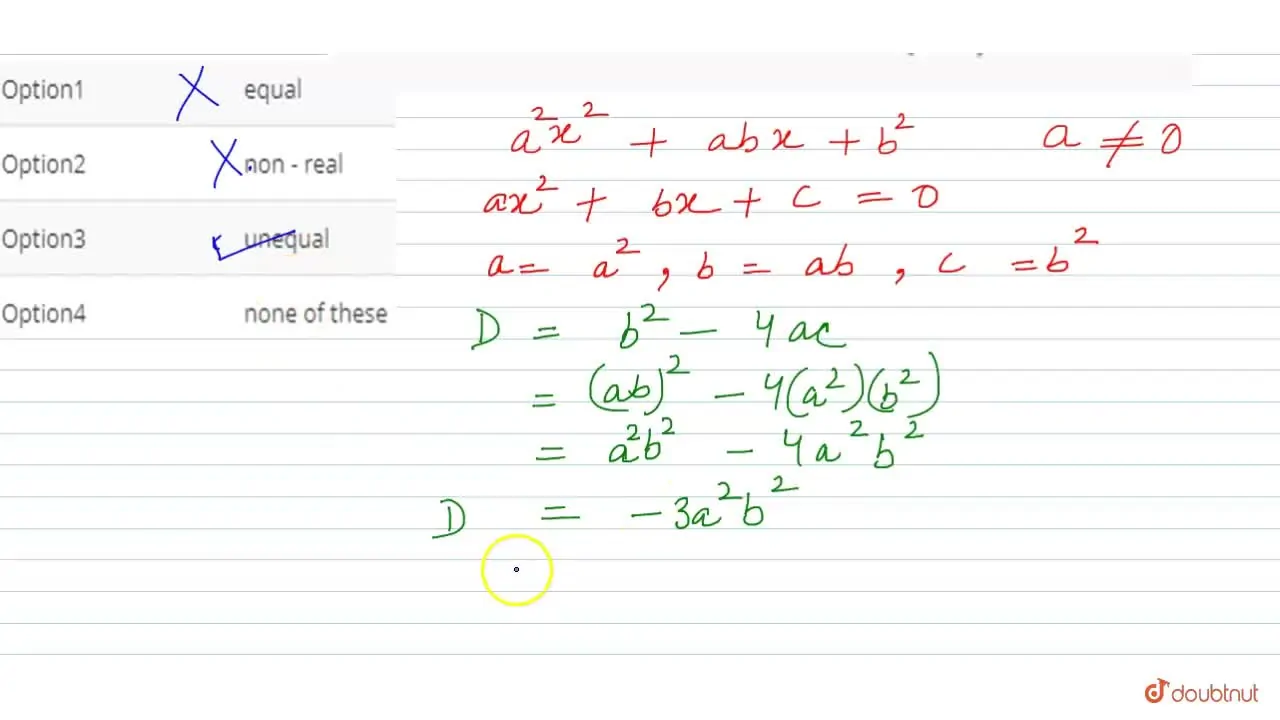The roots of a2x2+abx+b2,a≠0 are :
equal
non - real
unequal
none of these
The correct Answer is:C
Step by step video, text & image solution for The roots of a^(2)x^(2)+abx+b^(2),ane0 are : by Maths experts to help you in doubts & scoring excellent marks in Class 14 exams.
Related Playlists
- BOOK - ARIHANT SSCCHAPTER - THEORY OF EQUATIONSEXERCISE - EXERCISE(LEVEL 1)57videos
THEORY OF EQUATIONS
- BOOK - ARIHANT SSCCHAPTER - THEORY OF EQUATIONSEXERCISE - EXERCISE(LEVEL 2)20videos
THEORY OF EQUATIONS
- BOOK - ARIHANT SSCCHAPTER - THEORY OF EQUATIONSEXERCISE - EXERCISE(LEVEL 2)20videos
THEORY OF EQUATIONS
- BOOK - ARIHANT SSCCHAPTER - SQUARE ROOT AND CUBE ROOT EXERCISE - EXERCISE (C ) HIGHER SKILL LEVEL QUESTIONS14videos
SQUARE ROOT AND CUBE ROOT
- BOOK - ARIHANT SSCCHAPTER - TIME AND WORKEXERCISE - Final Round15videos
TIME AND WORK
Similar Questions
The roots of a2x2+abx+b2,a≠0 are :
View SolutionThe roots of ax2+bx+c=0,a≠0 are real and unequal, if (b2−4ac)
View SolutionThe roots of a1x2+b1x+c1=0are reciprocal of the roots of the equation a2x2+b2x+c2=0 if
View SolutionThe roots of the equation 3a2x2+8abx+4b2=0,where a≠0 are
View SolutionThe roots of (x−a)(x−b)=abx2 (a) are always real (c) are real and equal if and only if a=b (b)may be complex depending upon a (d)are real and distinct if and only if a≠0
View SolutionIf tan A and tan B are the roots of abx2−c2x+ab=0 where a, b, c are the sides of the triangle ABC then the value of sin2A+sin2B+sin2C is
View Solutionif a <c<b, then check the nature of roots of the equation
(a−b)2x2+2(a+b−2c)x+1=0View SolutionFind roots of a2x2−(a2b2+1)x+b2=0.
View SolutionFind the roots of the equation a2x2−3abx+2b2=0 by the method of completing the square.
View SolutionThe roots of the equation 2a2x2−2abx+b2=0 when a <0 and b>0 are :
View Solution


